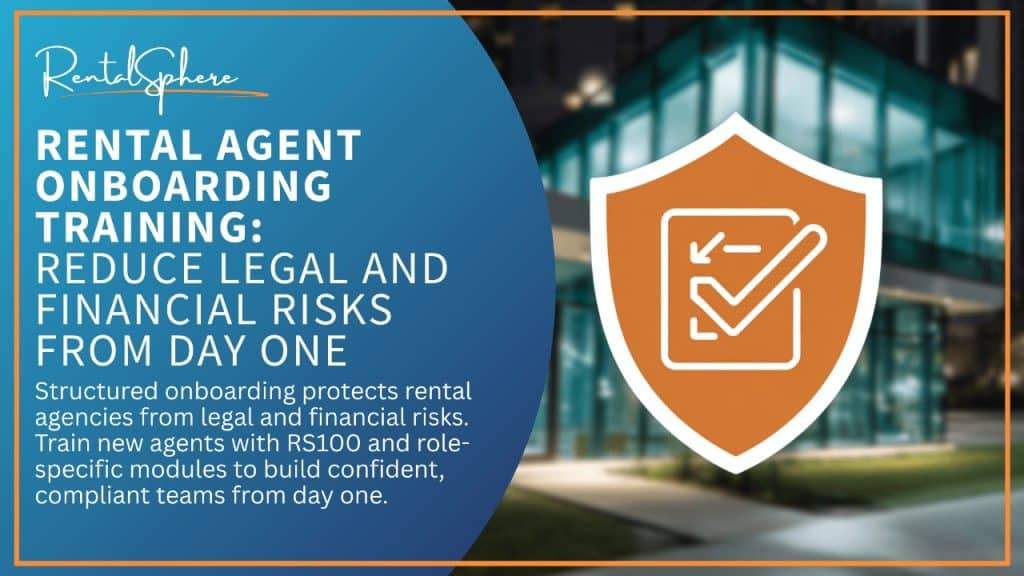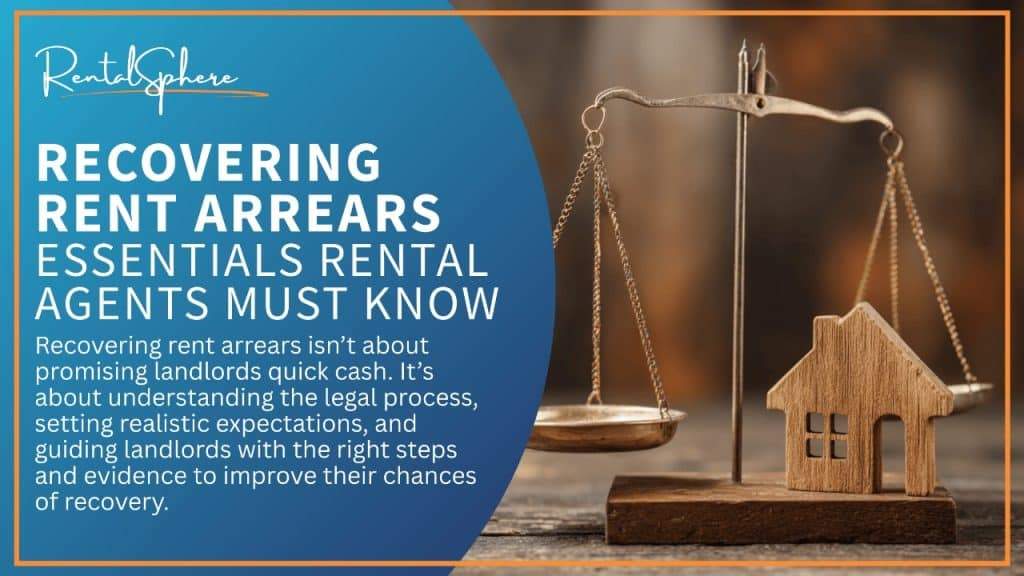Ultimate Rental Agent Onboarding Training Guide: 5 Steps to Avoid Costly Legal & Financial Risks
This ultimate guide explains why a structured rental agent onboarding training plan for new team members is critical to protect your agency and reduce legal, financial, and reputational risks in South Africa.
📩 Get new articles delivered directly to your inbox
Join 2,400+ rental pros who get smarter with tips, guides, compliance updates & more delivered straight to their inbox.
🚨 Why Rental Agent Onboarding Training Matters
Too many agencies place new recruits in front of landlords and tenants without proper rental agent onboarding training. This lack of onboarding training for rental teams is one of the biggest risks facing agencies today. Some principals rely on shadowing, or give a quick “crash course”, while many come from purely sales backgrounds and offer only very basic training. At best, this leaves gaps. At worst, it exposes the business to serious risk.
Shadowing can show how something is done, but rarely explains why — or whether it’s compliant. New team members may pick up bad habits, or make confident-sounding statements that turn out to be legally wrong.
Even unintentional mistakes can cost dearly:
- ⚠️ A candidate agent told a landlord they could “just give one month’s notice” to cancel a lease. The case ended up in front of the Rental Housing Tribunal.
- ⚠️ A new recruit promised a tenant that utilities were included in the rent. The lease said otherwise, sparking a formal complaint.
- ⚠️ Another advised a tenant that deposits would be refunded in full immediately after move-out — without mentioning the damage inspection. When deductions were made, the tenant complained to the Tribunal.
- ⚠️ A landlord insisted that the clause giving tenants the right to cancel a fixed-term lease early be removed. The agent agreed — not realising this right cannot be contracted out of (see the Consumer Protection Act (CPA)).
- ⚠️ An agent advised a landlord on cancellation penalties, but the property was re-advertised at a lower rental. The penalty was then challenged, and the landlord sought to recover losses from the agency.
Every statement made by a new team member reflects on the agency. One slip-up can lead to Tribunal disputes, financial claims, and reputational damage that takes years to undo. Tenants’ and consumers’ rights are protected under South African law (see the Property Practitioners Act, Rental Housing Act, CPA, FICA and POPIA), so accuracy matters.
👉 Onboarding training should be non-negotiable!
It protects the business and sets new recruits up for success.
🏡 Phase 1: Foundation Training for All New Recruits
Before anyone interacts with clients or the public, they need a baseline understanding of the entire rental life cycle: listing, tenant vetting, lease execution, renewals, and termination.
This foundation stage — Phase 1 — is for every new recruit. It’s the cornerstone of new rental agent training in South Africa, ensuring even support staff and candidate practitioners start off with compliance awareness:
- Candidate property practitioners
- Rental agents
- Reception staff fielding rental queries
- Admin staff processing applications
- Sales agents transitioning into rentals
RS100 Residential Rentals Kickstarter provides:
- A clear overview of the rental process from start to finish
- Awareness of 12 key pieces of legislation that impact lease management and procurement activities
- Holistic understanding of how each role supports compliance and protects landlord, tenant, and agency alike
With Phase 1 complete, new team members are confident, compliant, and ready to build on that foundation.
📘 Free Template: Personal Development Plan
Download a practical onboarding & refresher training plan to tick required modules, track completion dates, manager check-ins, and certificates — for every team member. Get the Personal Development Plan template.
📘 Benefits of Rental Agent Onboarding Training (for the Business)
- Staff who are compliant and confident from day one
- Consistent, professional service for landlords and tenants
- Lower risk of Tribunal disputes, financial claims, and penalties
- Faster ramp-up and productivity from new hires
- Improved retention, as recruits feel supported and competent
⚠️ Risks of Skipping Onboarding Training
- Costly Tribunal disputes
- Legal claims from landlords or tenants
- Reputational damage that erodes trust
- Confused, underprepared staff who burn out or resign early
🚀 Phase 2: Role-Specific Training & Certification
Once the foundation is in place, the next phase depends on the recruit’s role. This is where structured real estate onboarding training makes a difference — linking specific tasks to training modules and certificates.
For agents, Phase 2 includes:
- Legislation modules:
Property Practitioners Act (RS201),
Rental Housing Act (RS202),
FICA (RS204) and
POPIA (RS206) basics (required for all staff) - Process training one module at a time, with certificates of completion (e.g. Property Marketing, Applications, Lease Management)
For team members:
- Applications staff: Rental Application Workshop → certificate before handling applications
- Admin staff: Lease Management & Renewals training → certificate before managing renewals
- Viewing staff: Property Marketing training → certificate before conducting viewings
This phased, certification-based approach ensures every staff member is equipped — and proves it with a certificate of completion. Where lease drafting is part of the role, add the lease drafting workshop (RS101). For renewals, see our RS310 Masterclass on Lease Renewals.
🛠️ How to Roll Out Onboarding in Your Agency (5 Steps)
- Assign RS100 first to every new recruit before any client interaction — this is the foundation of effective rental agent onboarding training in South Africa.
- Map Phase 2 by role (e.g., Viewings/Marketing, Applications, Lease Management, RS101 if drafting).
- Use the PDP template to select required modules, set target dates, and track “certificate received”.
- Gate tasks by certification: no viewing/application/lease tasks until the relevant module is completed.
- Schedule check-ins at 2, 4 and 8 weeks to review progress, adjust workloads, and close knowledge gaps.
🌟 Building a Career, Not Just Filling a Role
Without a structured programme, recruits often see the job as temporary — there’s no sense of progression or professionalism.
A structured onboarding and training pathway:
- Shows that rentals is a career, not a stop-gap
- Builds respect for the industry through knowledge, compliance, and standards
- Attracts and retains higher-quality people who value the role
- Positions your agency as a professional organisation where staff are proud to belong
🏆 The Smart Way to Onboard New Rental Staff
- Phase 1: Foundation (RS100 for all)
- Phase 2: Role-specific training & certification
The result? A rental team that is qualified, compliant, and confident — protecting your agency and serving clients professionally from day one.
🎯 Ready to Reduce Risk & Elevate Your Team?
Step 1 → Enrol new staff in the RS100 Residential Rentals Kickstarter
Step 2 → Add legislation training and RS101 Lease Drafting Workshop
Step 3 → Roll out role-specific process training with certification
❓ FAQs: Rental Agent Onboarding Training
What is rental agent onboarding training?
It’s a structured programme that equips new rental staff with process knowledge, legal awareness, and role-specific skills before they interact with clients.
Why is onboarding training critical in South Africa?
Because leases and tenant/landlord rights are regulated by laws like the Property Practitioners Act, Rental Housing Act, Consumer Protection Act, FICA and POPIA. Training reduces legal and financial risk.
What should Phase 1 include?
A full rental lifecycle overview (RS100), awareness of 12 core laws, and clarity on roles, responsibilities, and compliance checkpoints.
How do we certify staff for specific tasks?
Use role-based modules with certificates (e.g., Viewings/Marketing, Applications, Lease Management, RS101 for lease drafting). Only “certified” staff perform each task.
Does this apply beyond agents?
Yes. Reception, admin, applications, and even support staff who interact with landlords and tenants all benefit from structured onboarding. It reduces mistakes and improves confidence.
Can existing staff use this as refresher training?
Absolutely. Many agencies use the Personal Development Plan template to re-train or update staff on legislation, processes, and compliance — especially after changes to the CPA or new Tribunal rulings.
Where can I access all training modules?
You can browse all RentalSphere training options — from RS100 to advanced legislation and process workshops — in the RentalSphere Academy.
🔥 Do you want to be top of your rental game?
Then the RentalSphere Inner Circle is where you belong!
- Exclusive monthly live training with rental experts
- Access to all past recordings & resources
- A monthly pre-written landlord newsletter
- Access to our expert partners at member-only rates
- WhatsApp support whenever you need it
💬 Rental Pro Hub on WhatsApp
600+ rental professionals already get:
📰 Articles & industry news
💡 Expert rental advice
🎟️ Training invites
✅ Admin-only messages = no noise, no spam.
RentalSphere — we FOCUS on #RentalMatters because #RentalsMatter.



